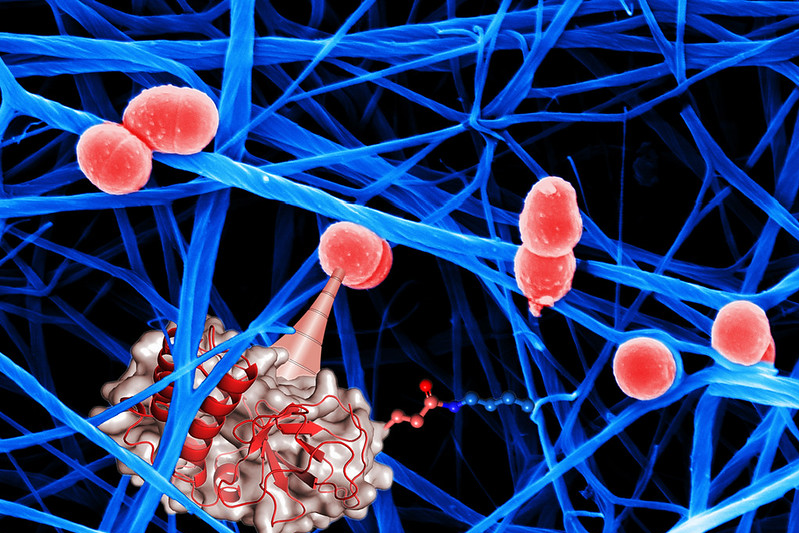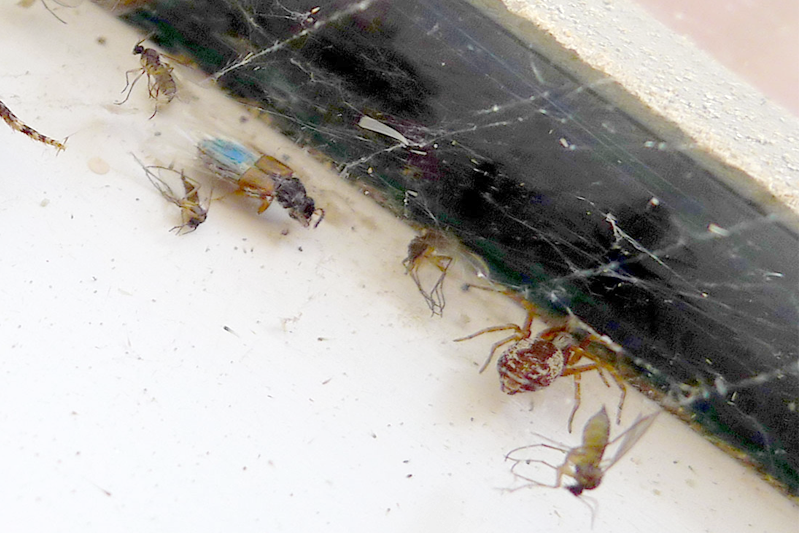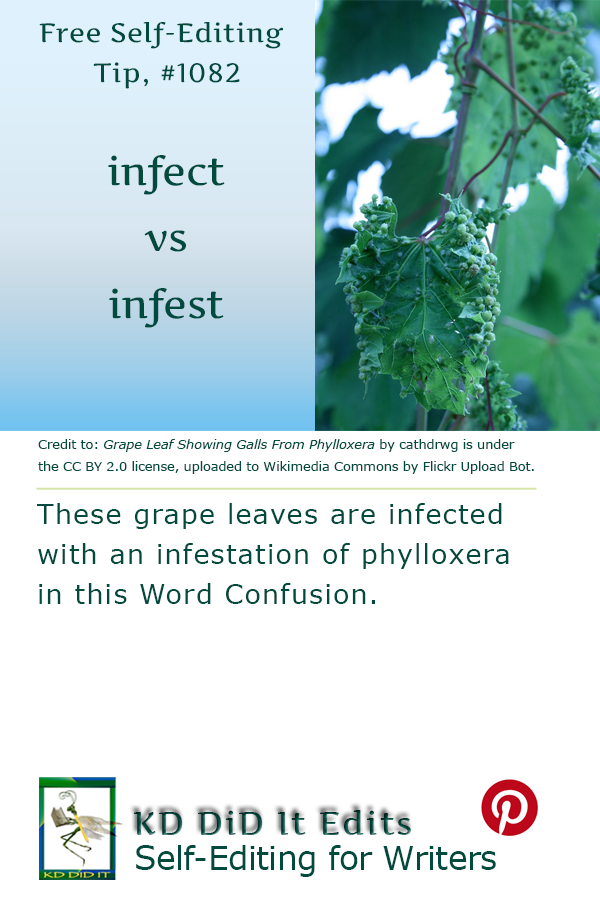There’s only one-letter difference between infect vs infest, so it’s easy to see how writers can confuse this pair of words, especially when both are primarily associated with disease.
To infect, germs or viruses are involved and penetrate a body, i.e., your body, a government body, a computer, etc.
To infest, a lot of external bugs attack a place, e.g., mosquitos swarm in the swamp or those danged horseflies that always seem to infest the beach!
Word Confusions . . .
. . . started as my way of dealing with a professional frustration with properly spelled words that were out of context in manuscripts I was editing as well as books I was reviewing. It evolved into a sharing of information with y’all. I’m hoping you’ll share with us words that have been a bête noir for you from either end.
If you found this post on “Infect versus Infest” interesting, consider tweeting it to your friends. Subscribe to KD Did It, if you’d like to track this post for future updates.
| Infect | Infest |
|---|---|

Bacteria Infect Tissues Using “Chemical Harpoons” by eLife-the journal is under the CC BY 2.0 license, via Flickr. |

Insects Attracted to Moth Light by Gail Hampshire is under the CC BY 2.0 license, via Wikimedia Commons. — Bugs infest this window sill. |
| Part of Grammar: | |
| Verb, intransitive & transitive
Third person present verb: infects |
Adjective; Verb, transitive
Third person present verb: infests |
| Verb, intransitive: To become infected Verb, transitive:
To corrupt or affect morally To imbue with some pernicious belief, opinion, etc. To affect so as to influence feeling or action [Law] To taint with illegality or expose to penalty, forfeiture, etc. |
Adjective: [Obsolete] Mischievous
Verb, transitive: To be numerous in, as anything undesirable or troublesome [Archaic] To harass |
| Examples: | |
| Verb, intransitive: She was infected with an infection. You must wash that cut on your knee in case it becomes infected. He was infected. Verb, transitive: She had a bad cold last week and has infected the rest of the class. The water was infected with cholera. Viruses have infected computer networks. The panic in his voice infected her. The news of the gold strike infected him with greed. His courage infected the others. “This class infects the offspring to be had low-down stability and/or very weak infection ability is arranged” (Biological). |
Adjective: The shark-infested waters put a kibosh on swimming. Infested homes don’t sell well. He claims it’s ghost-infested. Verb, transitive: Sharks infested the coastline. The cares that infest the day continued to bother her. “I come now to speak of the Pyrates infesting the West-Indies, where they are more numerous than in any other Parts of the World, on several Reasons: . . .” (Defoe). |
| Derivatives: | |
| Adjective: infectant, infected, infectible, infectious, infective, noninfected Adverb: infectiously Noun: infectedness, infecter, infection, infectivity, infectiveness, infector |
Adjective: uninfested Combined form: -infested Noun: infestant, infestation, infester Verb, transitive: reinfest |
| History of the Word: | |
| Late Middle English from the Latin infect- meaning tainted, from the verb inficere, which is from in- (into) + facere (put, do). | Late Middle English, in the sense torment, harass, is from the French infester or the Latin infestare meaning assail, from infestus meaning hostile.
The current sense dates from the mid-16th century. |
C’mon, get it out of your system, bitch, whine, moan . . . which words are your pet peeves? Also, please note that I try to be as accurate as I can, but mistakes happen or I miss something. Email me if you find errors, so I can fix them . . . and we’ll all benefit!
Satisfy your curiosity about other Word Confusions on its homepage or more generally explore the index of self-editing posts. You may also want to explore Book Layout & Formatting Ideas, Formatting Tips, Grammar Explanations, Linguistics, Publishing Tips, the Properly Punctuated, Writing Ideas and Resources, and Working Your Website.
Resources for Infect versus Infest
温达斯, J.D. “Biological Insect Control Agent.” Google Patents. 9 Apr 2019. Web. 6 June 2022. <https://patents.google.com/patent/CN1147275A/en>.
Apple Dictionary.com
Defoe, Daniel. “Introduction.” A General History of the Pirates. 2nd ed. London: T. Warner, 24.
Dictionary.com: infect, infest
“Infest vs Infect – What’s the Difference?” Wiki Diff. n.d. Web. 6 June 2022. <https://wikidiff.com/infest/infect&get;.
Pinterest Photo Credits:
Grape Leaf Showing Galls From Phylloxera by cathdrwg is under the CC BY 2.0 license, uploaded to Wikimedia Commons by Flickr Upload Bot.


